Filter by
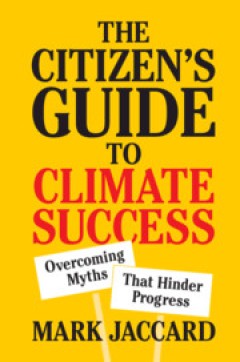
The citizen's guide to climate success : overcoming myths that hinder progress
Sometimes solving climate change seems impossibly complex, and it is hard to know what changes we all can and should make to help. This book offers hope. Drawing on the latest research, Mark Jaccard shows us how to recognize the absolutely essential actions (decarbonizing electricity and transport) and policies (regulations that phase out coal plants and gasoline vehicles, carbon tariffs). Rath…
- Edition
- -
- ISBN/ISSN
- 9781108783453
- Collation
- xiv, 292 p. : ill
- Series Title
- -
- Call Number
- 363.73874 JAC t

Histories of technology, the Environment and Modern Britain
Histories of Technology, the Environment and Modern Britain brings together historians with a wide range of interests to take a uniquely wide-lens view of how technology and the environment have been intimately and irreversibly entangled in Britain over the last 300 years. It combines, for the first time, two perspectives with much to say about Britain since the industrial revolution: the histo…
- Edition
- -
- ISBN/ISSN
- 9781911576570
- Collation
- xii, 354 p. : B&W, ill.
- Series Title
- -
- Call Number
- 609.41 AGA h
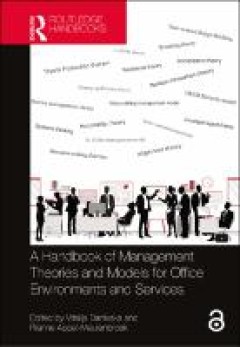
A handbook of management theories and models for office environments and serv…
Although workplace design and management are gaining more and more attention from modern organizations, workplace research is still very fragmented and spread across multiple disciplines in academia. There are several books on the market related to workplaces, facility management (FM), and corporate real estate management (CREM) disciplines, but few open up a theoretical and practical discussio…
- Edition
- -
- ISBN/ISSN
- 9781003128786
- Collation
- xv, 253p.
- Series Title
- -
- Call Number
- 658.312 DAN a
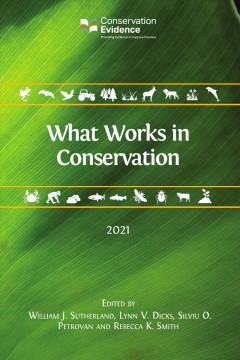
What works in conservation 2021
Does the creation of artificial reefs benefit subtidal benthic invertebrates? Is the use of organic farming instead of conventional farming beneficial to bat conservation? Does installing wildlife warning reflectors along roads benefit mammal conservation? Does the installation of exclusion and/or escape devices on fishing nets benefit marine and freshwater mammal conservation? What Works…
- Edition
- -
- ISBN/ISSN
- 9781800642744
- Collation
- 961 p. : ill. ; 24 cm
- Series Title
- -
- Call Number
- 333.9516 WHA w
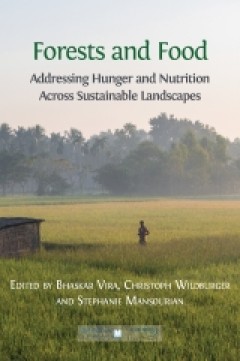
Forests and food : addressing hunger and nutrition across sustainable landscapes
As population estimates for 2050 reach over 9 billion, issues of food security and nutrition have been dominating academic and policy debates. A total of 805 million people are undernourished worldwide and malnutrition affects nearly every country on the planet. Despite impressive productivity increases, there is growing evidence that conventional agricultural strategies fall short of eliminati…
- Edition
- -
- ISBN/ISSN
- 9781783741953
- Collation
- viii, 280 p. : ill.
- Series Title
- -
- Call Number
- 338.19 WIL f
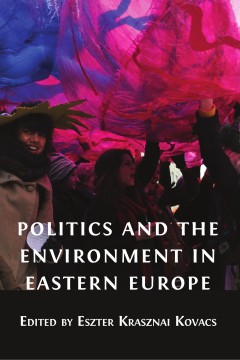
Politics and the environment in Eastern Europe
Europe remains divided between east and west, with differences caused and worsened by uneven economic and political development. Amid these divisions, the environment has become a key battleground. The condition and sustainability of environmental resources are interlinked with systems of governance and power, from local to EU levels. Key challenges in the eastern European region today include …
- Edition
- -
- ISBN/ISSN
- 9781800641341
- Collation
- 342 p. : ill.
- Series Title
- -
- Call Number
- 363.700947 KRA p
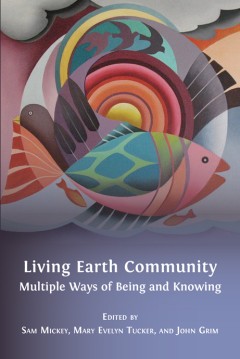
Living earth community: multiple ways of being and knowing
Living Earth Community: Multiple Ways of Being and Knowing is a celebration of the diversity of ways in which humans can relate to the world around them, and an invitation to its readers to partake in planetary coexistence. Innovative, informative, and highly accessible, this interdisciplinary anthology of essays brings together scholars, writers and educators across the sciences and humanities…
- Edition
- -
- ISBN/ISSN
- 9781783748051
- Collation
- xxxviii, 243 p. : ill. : ind. ; 24 cm
- Series Title
- -
- Call Number
- 304.2 LIV l
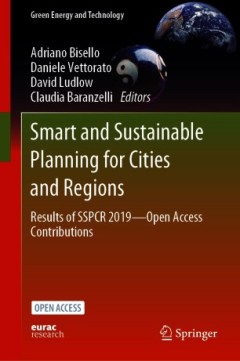
Smart and sustainable planning for cities and regions : results of SSPCR 2015
This open access book offers a selection of research papers and case studies presented at the 3rd international conference “Smart and Sustainable Planning for Cities and Regions”, held in December 2019 in Bolzano, Italy, and explores the concept of smart and sustainable planning, including top contributions from academics, policy makers, consultants and other professionals. Innovation pr…
- Edition
- -
- ISBN/ISSN
- 9783030577643
- Collation
- xvii, 307p. : ill.
- Series Title
- -
- Call Number
- 307.1216 SMA s
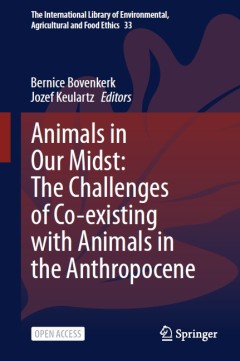
Animals in our midst : the challenges of co-existing with animals in the anth…
This Open Access book brings together authoritative voices in animal and environmental ethics, who address the many different facets of changing human-animal relationships in the Anthropocene. As we are living in complex times, the issue of how to establish meaningful relationships with other animals under Anthropocene conditions needs to be approached from a multitude of angles. This book offe…
- Edition
- -
- ISBN/ISSN
- 9783030635237
- Collation
- xiii, 579p. : ill.
- Series Title
- -
- Call Number
- 179.3 ANI a
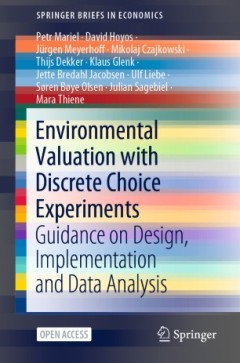
Environmental valuation with discrete choice experiments : guidance on design…
This open access book offers up-to-date advice and practical guidance on how to undertake a discrete choice experiment as a tool for environmental valuation. It discusses crucial issues in designing, implementing and analysing choice experiments. Compiled by leading experts in the field, the book promotes discrete choice analysis in environmental valuation through a more solid scientific basis …
- Edition
- -
- ISBN/ISSN
- 9783030626693
- Collation
- xiii, 129p. : ill.
- Series Title
- -
- Call Number
- 333.7 ENV e
 Computer Science, Information & General Works
Computer Science, Information & General Works  Philosophy & Psychology
Philosophy & Psychology  Religion
Religion  Social Sciences
Social Sciences  Language
Language  Pure Science
Pure Science  Applied Sciences
Applied Sciences  Art & Recreation
Art & Recreation  Literature
Literature  History & Geography
History & Geography